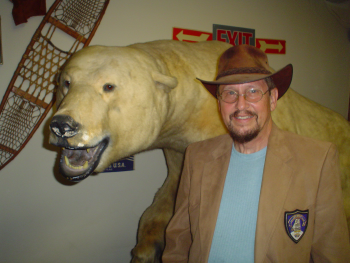
About Robert G. Williscroft:
I am a retired submarine officer, deep-sea and saturation diver, scientist, author of 19 books and hundreds of articles, and a lifelong adventurer. I spent 22 months underwater, a year in the equatorial Pacific, three years in the Arctic ice pack, and a year at the Geographic South Pole. I hold degrees in Marine Physics and Meteorology and a doctorate for developing a system to protect SCUBA divers in contaminated water. As a prolific author of both non-fiction, Cold War thrillers, and hard science fiction, I live in Centennial, Colorado, with my family.
I am a member of Colorado Authors’ League, Science Fiction Writers of America, Libertarian Futurist Society, Los Angeles Adventurers’ Club, Mensa, Military Officers’ Association of America, American Legion, and the NRA. I spend most of my time writing my next book, speaking to various regional groups, and hanging out with the girl of my dreams, Jill, and her two cats.
What inspires you to write?
I see the world through a personal lens, one that few others (if any) have. This gives a unique perspective to my writing–whether I'm telling about an espionage event under the Arctic ice pack or speculating on why Saturn's moon Iapetus has a 20-km-high ridge around its equator. I have dove in the Arctic ice pack with Orcas and on the equator with sharks. I survived a year at the geographic South Pole. These events propel my writing.
What authors do you read when you aren’t writing?
I am very eclectic in my reading. Out of the past, I like Heinlein, Van Vogt, Clarke, Hogan, Clancy, McClain, Cussler, Durant–but this is so incomplete. There are so many more. Current writers, I like John Rosenman, Alastair Mayer, Dave Edlund, Ken Weene–again, this list is simply too short.
Tell us about your writing process.
I get an idea from somewhere. For example, I took several scientific papers with me to the South Pole. One, by Keith Lofstrom, was about constructing a Space Launch Loop–a way to get to space without rockets. When I returned to the U.S., I looked Keith up and we spent several days together outlining what became the hard science fiction novel "Slingshot."
I was reviewing the videos from the Cassini flyby of Saturn's Moon Iapetus. I noted that Iapetus had a high rocky ridge all around its equator and that its density was less than that of water. I asked myself, "What if Iapetus were a derelict starship?" That question led to volumes two & three of "The Starchild Trilogy"–"The Starchild Compact" and "The Iapetus Federation" which was nominated for both the Nebula and Prometheus awards.
I led a team of divers in the Cold War who tapped into Soviet submarine communications cables on the bottom of the Sea of Okhotsk. That led to bestselling "Operation Ivy Bells" and its sequels.
The actual process: I get the idea and spend some time ruminating about it. Then I create an outline in Excel. As part of the outline, I create a description and history of each character, including things like what kind of drink does the character like, music, cars, etc.? Then I try to write at least 1,000 words a day until I reach the end. Sometimes, my characters take the story in a different direction than I had planned. When this happens, I go back into the outline and change it as necessary to conform to where my characters want the story to go. Then I edit several times and have a couple of beta-readers look at it, and my wife goes over the MS with a fine-tooth comb. She fancies herself my harshest editor–which may well be correct.
For Fiction Writers: Do you listen (or talk to) to your characters?
Yes and no. It's not so much a conversation as an urging by a character: "I wouldn't do it that way!" or "I want to take this path, NOT that one."
What advice would you give other writers?
Don't quit! Keep at it. "Perfect" is the enemy of "good enough," but don't let "good enough" be your standard.
How did you decide how to publish your books?
My first published book was my doctoral dissertation, "A System for Protecting SCUBA Divers from the Effects of Contaminated Water," published by the U.S. Department of Commerce and distributed to port captains the world over. My next four books were commercially published. The fourth one, a current events book ("The Chicken Little Agenda: Debunking "Experts'" Lies"), became a bestseller after I put some personal money into its promotion. I broke even. My publisher did quite well. So, I created my own publishing company in order to retain the profits myself. I did well, but it was a lot of work. Recently, I entered a cooperative relationship with Fresh Ink Group, where we combine our efforts to publish my books. It seems to be working well.
What do you think about the future of book publishing?
The whole field of publishing is changing as the virtual world changes. I think printed books will be around indefinitely, but with time, only "better" books will be printed, and those often in leather with gilt edges.
I see ebooks morphing into a type of VR experience where a reader can "hold" a book and "turn" the pages as with an actual printed book. Audiobooks will play a larger role, trending toward something like an audio play.
What genres do you write?: Cold War technothrillers, Hard Science Fiction, Children's STEM learning through science fiction
What formats are your books in?: Both eBook and Print, Audiobook
Website(s)
Robert G. Williscroft Home Page Link
Link To Robert G. Williscroft Page On Amazon
Link to Author Page on Fresh Ink Group
Your Social Media Links
Goodreads
Facebook
Twitter
Pinterest
LinkedIn
Instagram
YouTube
All information in this post is presented “as is” supplied by the author. We don’t edit to allow you the reader to hear the author in their own voice.
